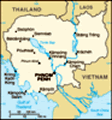Advertisement
Published: February 9th 2012
It's got to be done.
That's what the nice man at the travel agent's said.
If you're going to Cambodia, you've got to go to Phnom Penh and do the genocide tour, S-21 and the Killing Fields. Watch the film before you go.
So, we did.
Where were you during the period of 1975 to 1978? I'd just left school, moved in to a flat with my friends and was busy exploring the cosmos, young ladies, and music.
For the Cambodians, things were a bit more scary. During that time, more than 3 million people were executed by Pol Pot and the Khmer Rouge. Anybody who was educated. Men, women, teenages, children. Plus their families, their relatives, even their friends.
It was a time of fear. Our guide, Thaly (pronounced tar-lee), remembers it even though she was only five at the time. Her family had to flee the city to the country, start again. She remembers her parents building a house out of bamboo and having to live off the land. Eventually, at the age of eight, she was separated from her family and made to work in the rice fields by the Khmer Rouge.
She had to work very hard she says, her voice trembling. Not long after that, they gave her another job looking after oxen and collecting their dung for fertiliser.
Eventually Cambodia was liberated by the Vietnamese and the Khmer Rouge dismantled and destroyed. At the end, they turned on themselves, killing each other, executing the young boys and girls who had been brainwashed into believing all the hype. Now, everyone has been given an amnesty. Everyone except five senior leaders who are still alive and are currently on trial (Pol Pot himsef died of a heart attack). They're on the telly as I type. I can hear them right now, trying to wriggle out of the questions put to them (no, I did not know about the atrocities, it was all someone else fault).
Even though the reign of the Khmer Rouge was over, Thaly and her family didn't dare move back to the city as they didn't know what was true and what was rumour. They didn't speak Vietnamese and so stayed in the country. Eventually, her father borrowed a bicycle and rode back to Phnom Penh (over 200 miles). When he got to his house there
were other people living in it. This is my house, he said. Tough, they said, first come, first serve.
That was it. They had to start again from scratch.
We asked Thaly how she had become educated and learned how to speak English. Fortunately, both of her parents were teachers and they used to tutor her at night. During the day she had to help with the chores and look after the family. Eventually, she persuaded her parents to allow her to go to secondary school which they eventually did and she then went on to win a scholarship to study in Russia. As for the English, even in the 80's, it was forbidden to learn English in Cambodia (the only languages allowed were Cambodian, Vietnamese and Russian) and so she learned at a secret school.
Things are much better now as Cambodia is opening up to the world. On her return to Cambodia, Thaly started work as a tourist guide for Russions but they don't get many Russions in Cambodia. Fortunately, she had also learned enough English to gain her English guide tour licence and here she is. Her parents still live in the country (not
in the same place) and could never bring themselves to come back to Phnom Penh.
There were 343 killing fields in Cambodia, basically, fields where they executed people, by beating them with clubs and axes, and buried them, often still alive, in mass graves. They would play loud music while they killed people so the neighbours couldn't hear the screams.
We visited one such killing field - Choeng Ek. Around 20,000 skeletons were found in that field alone. S-21 was a school that was turned into a makeshift prison where they held and tortured people first before shipping them off to the killing fields.
All this within living memory. Having Thaly recount the story first hand was very sobering. She has her own daughter now, and finds it hard to believe that she herself was only 8 when it all happened. She is remarkably chirpy. A survivor.
Sort of puts things in perspective really doesn't it ?
Joe Hyde, BBC News, Cambodia
Advertisement
Tot: 0.052s; Tpl: 0.014s; cc: 6; qc: 24; dbt: 0.0302s; 1; m:domysql w:travelblog (10.17.0.13); sld: 1;
; mem: 1mb












Jamie
non-member comment
Incredibly sobering
Astounding what we as human beings can do to one another due to an utter lack of acceptance of perceived difference and the determination for power. How strange we are. What happened in this place mustn't ever be forgotten. Nice reporting Mr Hyde - glad to see our license fee going to such good use...